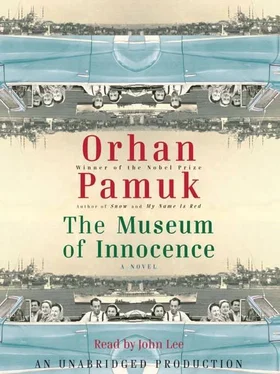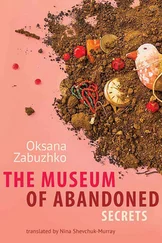After a few drinks, most of the film people and journalists and artists who frequented bars and taverns like the Pelür were given to weepy self-pity, but after only two drinks Füsun would become as cheerful as a child, as chirpy as a flighty girl, and on our visits to summer cinemas and Bosphorus restaurants, I sometimes imagined that the reason for her happiness was that the three of us were together. Having long tired of all the gossip and wisecracks at the Pelür, I now seldom went there, and when I did it was to spy on those surrounding Füsun, and if possible, before the evening’s end, to extract Füsun and Feridun from the bar to drive with Çetin on a dinner excursion to the Bosphorus. Füsun would sulk over leaving the Pelür early, but once in the car she’d have such a good time chatting with Çetin and the rest of us that I’d decide, just as I had in the summer of 1976, that going out to eat together more often would do us all good. But first I had to persuade Feridun. It was out of the question for Füsun and me to go gallivanting to any restaurant on our own, like lovers. As Feridun resisted being dragged away from his film friends, I enlisted Aunt Nesibe to join the party and prevail on Füsun and her husband to come eat fish at Urcan in Sariyer.
In the summer of 1977 we cajoled Tarık Bey into joining us as well, and as he warmed to the idea, the entire team of television-watching Keskins would head out to eat on the Bosphorus, with Çetin at the wheel. I would like every visitor to our museum to find these outings as pleasant as I did, so I shall go into some detail here. After all, isn’t the purpose of the novel, or of a museum, for that matter, to relate our memories with such sincerity as to transform individual happiness into a happiness all can share? That summer these excursions to the meyhanes of the Bosphorus fast became a custom we all relished. In the years that followed, whether it was winter or summer, we would, at least once a month, get into the car, as excited as wedding guests, and go off to a restaurant or one of the large, famous gazinos , to listen to the melodies and aged crooners that Tarık Bey enjoyed so much. There were, of course, intervals when we’d fail to relish our pleasures-moments of tension or confusion between me and Füsun, anxiety that our film work would never begin-and these joyless spells would last for months until unexpectedly we would be driving around in the car together, and we would notice how delighted we actually were to be together, how close we had become and how much we loved each other.
In those days, the most popular place along the Bosphorus was Tarabya, with its line of crowded restaurants spilling across the sidewalks, and the tombala men wandering among the tables, along with the mussel vendors, the fresh almond vendors, the photographers who took your picture and brought back the developed shots within the hour, the ice cream men, the bands of musicians playing Ottoman music and the traditional singers who performed in most of the restaurants. (Back then you wouldn’t see a single tourist.) I remember how Aunt Nesibe laughed admiringly at the speed and daring of the waiters as they darted across the narrow road that divided the restaurants from the tables, weaving their way through the traffic with their heavy trays laden with food.
On our first excursion together we went to a relatively modest restaurant called Huzur (peace), which happened to have a free table, and which Tarık Bey had instantly taken to, because of its proximity to the flashy Mücevher Gazino next door, which meant that one could sit in the restaurant and hear the old Turkish songs being sung “from a distance and for free.” The next time, when I proposed that we could better hear the singers if we were actually sitting in the Mücevher itself, Tarık Bey said, “Oh no, Kemal Bey! Why pay to hear that awful band, and that woman who sounds like a crow?” but for the rest of the meal, he gave all his attention, sometimes joyful and sometimes angry, to the music blaring from the gazino . He would correct the “tuneless, tone-deaf” singers in a loud voice, and finish their lines before they could, just to prove he knew the lyrics, and after the third glass of rakı he would close his eyes and his head would sway to the music with deep spiritual rapture.
On our Bosphorus excursions from the house in Çukurcuma, to some extent we threw off the roles we played indoors, and that made me relish our trips. Füsun would sit right next to me in the car and at the restaurant, as she never did at the house. And as we sat surrounded by tables, no one noticed if my arm pressed up against her, and as her father listened to the music with his eyes shut and her mother watched the shimmering lights of the Bosphorus in the vaporous darkness, we would whisper to each other over the din, chatting about it didn’t matter what-the food, the beauty of the evening, how endearing her father was-as tentatively as two bashful young people who had just met and only recently discovered how a boy might flirt with a girl, or form a relationship with her, as they did in Europe. Füsun was otherwise liberated, too; while ordinarily averse to smoking in front of her father, in Bosphorus restaurants she would puff away on her cigarettes like some formidable European career woman. I remember once, having decided to try our luck, we bought a ticket from a rascally tombala man in dark glasses, and when we didn’t win a prize, we glanced at each other and both said, “Unlucky at cards…,” inducing in both of us a terrible embarrassment and then elation.
Much as this happiness derived simply from being out of the house, and the twin joys (extolled by many an Ottoman court poet) of drinking wine and sitting beside one’s beloved, there was also the diversion of the street crowds, as traffic jams on the road between the restaurants and the tables provoked quarrels between the people at the tables and the people in the cars: “Why don’t you look at the road instead of the girl,” someone would say, or “Why did you flick your cigarette at me?” As the evening progressed, drunken revelers would begin to sing, and tables would exchange applause and lusty cries. Suddenly a besequined “oriental” dancer would dash from one restaurant to the next, on her way to do a show, and as her costume and bronzed skin caught the car lights, drivers would lean ecstatically on their horns, like ships blowing their whistles on November 10 to mark the moment of Atatürk’s death. On a warm night the wind might suddenly change direction, and all at once the dust and dirt overlaying the rubbish strewn on the cobblestone sidewalk along the shore-the nuts and shells and watermelon rinds and wastepaper and newspapers and soda caps and corncobs and seagull and pigeon droppings and plastic bags-would come to life, and all at once the trees across the street would begin to rustle, and Aunt Nesibe would say, “Beware, the dust has kicked up, children, don’t let it get on your food!” and she’d shield the plates with her hands. Then the wind would suddenly change direction again and rush in from the northeast, bringing us cool air that smelled of iodine.
Toward the end of the evening, when people started arguing with the waiters, challenging their bills, and there was singing at every table, Füsun and I would press our arms and legs and hands together even closer, so close sometimes that I thought I would faint. Sometimes in such happiness I couldn’t resist stopping a photographer to have him take our picture, or a gypsy woman to tell our fortune as if we had only just met. As I sat there pressed against Füsun, I would imagine the day we married, I would gaze at the moon and lose myself in dreams, but no sooner had I drunk another raki on the rocks than I would notice that I had grown hard just as in a dream, but now trembling with pleasure I would not panic, for I felt as if I-we-had become like our ancestors in heaven, souls cleansed of guilt and sin, and I would abandon myself to my dreams, my delights, and the bliss of sitting next to Füsun.
Читать дальше












